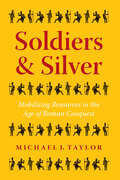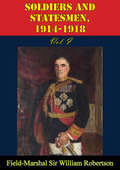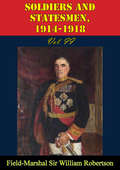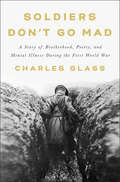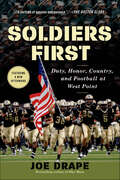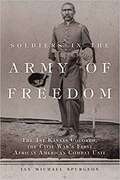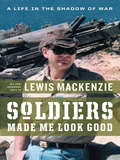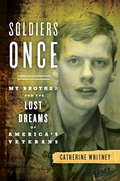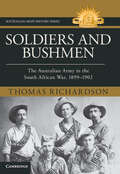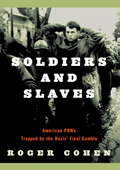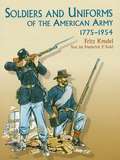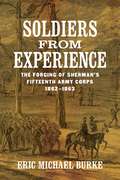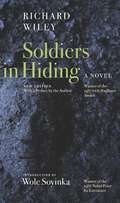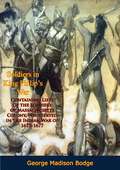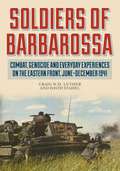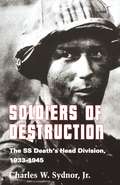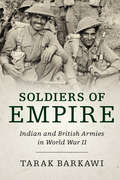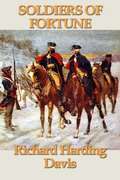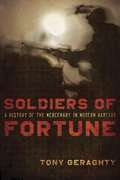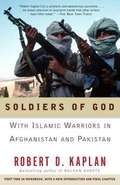- Table View
- List View
Soldiers & Silver: Mobilizing Resources in the Age of Roman Conquest (Ashley and Peter Larkin Series in Greek and Roman Culture)
by Michael J. Taylor&“Taylor&’s study critically compares the manpower and revenues of Republican Rome with those of Carthage and the Antigonid, Seleucid and Ptolemaic kingdoms.&” —Dominic Rathbone, author of Civilizations of the Ancient World By the middle of the second century BCE, after nearly one hundred years of warfare, Rome had exerted its control over the entire Mediterranean world, forcing the other great powers of the region—Carthage, Macedonia, Egypt, and the Seleucid empire—to submit militarily and financially. But how, despite its relative poverty and its frequent numerical disadvantage in decisive battles, did Rome prevail? Michael J. Taylor explains this surprising outcome by examining the role that manpower and finances played, providing a comparative study that quantifies the military mobilizations and tax revenues for all five powers. Though Rome was the poorest state, it enjoyed the largest military mobilization, drawing from a pool of citizens, colonists, and allies, while its wealthiest adversaries failed to translate revenues into large or successful armies. Taylor concludes that state-level extraction strategies were decisive in the warfare of the period, as states with high conscription and low taxation raised larger, more successful armies than those that primarily sought to maximize taxation. Comprehensive and detailed, Soldiers and Silver offers a new and sophisticated perspective on the political dynamics and economies of these ancient Mediterranean empires. &“An interesting read . . . Taylor has succeeded at clarifying an often-unclear topic with some fine scholarship.&” —Ancient World Magazine &“Taylor considers the systems of all of the major players in the Mediterranean state system . . . and that fact alone puts this study head and shoulders above similar older efforts.&” —A Collection of Unmitigated Pedantry
Soldiers & Silver: Mobilizing Resources in the Age of Roman Conquest (Ashley and Peter Larkin Series in Greek and Roman Culture)
by Michael J. Taylor&“Taylor&’s study critically compares the manpower and revenues of Republican Rome with those of Carthage and the Antigonid, Seleucid and Ptolemaic kingdoms.&” —Dominic Rathbone, author of Civilizations of the Ancient World By the middle of the second century BCE, after nearly one hundred years of warfare, Rome had exerted its control over the entire Mediterranean world, forcing the other great powers of the region—Carthage, Macedonia, Egypt, and the Seleucid empire—to submit militarily and financially. But how, despite its relative poverty and its frequent numerical disadvantage in decisive battles, did Rome prevail? Michael J. Taylor explains this surprising outcome by examining the role that manpower and finances played, providing a comparative study that quantifies the military mobilizations and tax revenues for all five powers. Though Rome was the poorest state, it enjoyed the largest military mobilization, drawing from a pool of citizens, colonists, and allies, while its wealthiest adversaries failed to translate revenues into large or successful armies. Taylor concludes that state-level extraction strategies were decisive in the warfare of the period, as states with high conscription and low taxation raised larger, more successful armies than those that primarily sought to maximize taxation. Comprehensive and detailed, Soldiers and Silver offers a new and sophisticated perspective on the political dynamics and economies of these ancient Mediterranean empires. &“An interesting read . . . Taylor has succeeded at clarifying an often-unclear topic with some fine scholarship.&” —Ancient World Magazine &“Taylor considers the systems of all of the major players in the Mediterranean state system . . . and that fact alone puts this study head and shoulders above similar older efforts.&” —A Collection of Unmitigated Pedantry
Soldiers And Statesmen, 1914-1918 Vol. I (Soldiers And Statesmen, 1914-1918 #1)
by Field-Marshal Sir William RobertsonSir William "Wully" Robertson was the first (and only) man to rise from the lowliest rank of private soldier to the highest rank of Field Marshal within the British Army. Determined, strong-willed and militarily conservative he served ably in field and staff positions in India and South Africa; always chary of wasting his men's lives. When the First World War broke out he sailed with the BEF in 1914 as quartermaster-general but was promoted to the post of chief of the Imperial General Staff in 1915. A staunch "westerner" who believed that the war could only be won in France and Flanders by knocking the German army out of the war, he faced many amateur strategists who wanted to squander resources in other theatres. By 1918 he resigned his post in disgust at the policies of David Lloyd George who refused to reinforce Sir Douglas Haig in France precipitating the German breakthroughs of the spring and summer.From the very start of the war Robertson was at the hub of the action at the highest levels of the British war effort; in these two volumes he reveals the decisions and struggles that shaped that strategy. Filled with the opinion of the "westerner" school of thought; through the pages Robertson despairs at the Gallipoli invasion, sets against the Salonika disaster and fumes at the civilian members of the war cabinet and the "Supreme War Council". Written a short time after the war with it all fresh and even with some bad feeling in mind these two volumes are essential to the History of the First World War.
Soldiers And Statesmen, 1914-1918 Vol. II (Soldiers And Statesmen, 1914-1918 #2)
by Field-Marshal Sir William RobertsonSir William "Wully" Robertson was the first man to rise from the lowliest rank of private soldier to the highest rank of Field Marshal within the British Army. Determined, strong-willed and militarily conservative he served ably in field and staff positions in India and South Africa; always chary of wasting his men's lives. When the First World War broke out he sailed with the BEF in 1914 as quartermaster-general but was promoted to the post of chief of the Imperial General Staff in 1915. A staunch "westerner" who believed that the war could only be won in France and Flanders by knocking the German army out of the war, he faced many amateur strategists who wanted to squander resources in other theatres. By 1918 he resigned his post in disgust at the policies of David Lloyd George who refused to reinforce Sir Douglas Haig in France precipitating the German breakthroughs of the spring and summer.From the very start of the war Robertson was at the hub of the action at the highest levels of the British war effort; in these two volumes he reveals the decisions and struggles that shaped that strategy. Filled with the opinion of the "westerner" school of thought; through the pages Robertson despairs at the Gallipoli invasion, sets against the Salonika disaster and fumes at the civilian members of the war cabinet and the "Supreme War Council". Written a short time after the war with it all fresh and even with some bad feeling in mind these two volumes are essential to the History of the First World War.
Soldiers Don't Go Mad: A Story of Brotherhood, Poetry, and Mental Illness During the First World War
by Charles GlassA brilliant and poignant history of the friendship between two great war poets, Siegfried Sassoon and Wilfred Owen, alongside a narrative investigation of the origins of PTSD and the literary response to World War IFrom the moment war broke out across Europe in 1914, the world entered a new, unparalleled era of modern warfare. Soldiers faced relentless machine gun shelling, incredible artillery power, flame throwers, and gas attacks. Within the first four months of the war, the British Army recorded the nervous collapse of ten percent of its officers; the loss of such manpower to mental illness – not to mention death and physical wounds – left the army unable to fill its ranks. Second Lieutenant Wilfred Owen was twenty-four years old when he was admitted to the newly established Craiglockhart War Hospital for treatment of shell shock. A bourgeoning poet, trying to make sense of the terror he had witnessed, he read a collection of poems from a fellow officer, Siegfried Sassoon, and was impressed by his portrayal of the soldier&’s plight. One month later, Sassoon himself arrived at Craiglockhart, having refused to return to the front after being wounded during battle.Though Owen and Sassoon differed in age, class, education, and interests, both were outsiders – as soldiers unfit to fight, as gay men in a homophobic country, and as Britons unwilling to support a war likely to wipe out an entire generation of young men. But more than anything else, they shared a love of the English language, and its highest expression of poetry. As their friendship evolved over their months as patients at Craiglockhart, each encouraged the other in their work, in their personal reckonings with the morality of war, as well as in their treatment. Therapy provided Owen, Sassoon, and fellow patients with insights that allowed them express themselves better, and for the 28 months that Craiglockhart was in operation, it notably incubated the era&’s most significant developments in both psychiatry and poetry.Drawing on rich source materials, as well as Glass&’s own deep understanding of trauma and war, Soldiers Don't Go Mad tells for the first time the story of the soldiers and doctors who struggled with the effects of industrial warfare on the human psyche. Writing beyond the battlefields, to the psychiatric couch of Craiglockhart but also the literary salons, halls of power, and country houses, Glass charts the experiences of Owen and Sassoon, and of their fellow soldier-poets, alongside the greater literary response to modern warfare. As he investigates the roots of what we now know as post-traumatic stress disorder, Glass brings historical bearing to how we must consider war&’s ravaging effects on mental health, and the ways in which creative work helps us come to terms with even the darkest of times.
Soldiers First: Duty, Honor, Country, and Football at West Point
by Joe DrapeIn Soldiers First, bestselling author Joe Drape reveals the unique pressures and expectations that make a year of Army football so much more than just a tally of wins and losses.The football team at the U.S. Military Academy is not like other college football teams. At other schools, athletes are catered to and coddled at every turn. At West Point, they carry the same arduous load as their fellow cadets, shouldering an Ivy League–caliber education and year-round military training. After graduation they are not going to the NFL but to danger zones halfway around the world. These young men are not just football players, they are soldiers first.New York Times sportswriter Joe Drape takes us inside the world of Army football, as the Black Knights and their third-year coach, Rich Ellerson, seek to turn around a program that had recently fallen on hard times, with the goal to beat Navy and "sing last" at the Army-Navy game in December. The 2011 season would prove a true test of the players' mettle and perseverance.Drawing on his extensive and unfettered access to the players and the coaching staff, Drape introduces us to this special group of young men and their achievements on and off the field. Anchoring the narrative and the team are five key players: quarterback Trent Steelman, the most gifted athlete; linebacker Steve Erzinger, who once questioned his place at West Point but has become a true leader; Andrew Rodriguez, the son of a general and the top scholar-athlete; Max Jenkins, the backup quarterback and the second-in-command of the Corps of Cadets; and Larry Dixon, a talented first-year running back. Together with Coach Ellerson, his staff, and West Point's officers and instructors, they and their teammates embrace the demands made on them and learn crucial lessons that will resonate throughout their lives—and ours.
Soldiers In Hiding
by Richard WileyThis remarkable novel is not only an imaginative work of the very highest order but a cross-cultural tour de force of extraordinary daring and vision. It begins in Tokyo in 1941, when Teddy Maki and Jimmy Yamamoto, two young Japanese-American jazz musicians, are stranded in Japan after the bombing of Pearl Harbor, drafted into the Japanese army and sent to the Philippines, the scene of bloody conflict with guerrillas and American troops. Rather than act as true soldiers, the two young men attempt to disengage themselves from the savagery of a war in which they are unable to choose sides. But such innocence is impossible to maintain. Thirty years later, Teddy Maki, by then a star of Japanese television, is still haunted by Jimmy's death and his own failure to disobey the order of his commanding officer to shoot an American prisoner. The guilt that poisons his relationship with his wife and son and with the country in which he has chosen to live as a perpetual outsider speaks to the moral issues raised by all wars -- from Auschwitz to My Lai.
Soldiers In The Army Of Freedom: The 1st Kansas Colored, The Civil War's First African American Combat Unit (Campaigns And Commanders #47)
by Ian Michael SpurgeonIt was 1862, the second year of the Civil War, though Kansans and Missourians had been fighting over slavery for almost a decade. For the 250 Union soldiers facing down rebel irregulars on Enoch Toothman’s farm near Butler, Missouri, this was no battle over abstract principles. These were men of the First Kansas Colored Infantry, and they were fighting for their own freedom and that of their families. They belonged to the first black regiment raised in a northern state, and the first black unit to see combat during the Civil War. Soldiers in the Army of Freedom is the first published account of this largely forgotten regiment and, in particular, its contribution to Union victory in the trans-Mississippi theater of the Civil War. As such, it restores the First Kansas Colored Infantry to its rightful place in American history. Composed primarily of former slaves, the First Kansas Colored saw major combat in Missouri, Indian Territory, and Arkansas. Ian Michael Spurgeon draws upon a wealth of little-known sources—including soldiers’ pension applications—to chart the intersection of race and military service, and to reveal the regiment’s role in countering white prejudices by defying stereotypes. Despite naysayers’ bigoted predictions—and a merciless slaughter at the Battle of Poison Spring—these black soldiers proved themselves as capable as their white counterparts, and so helped shape the evolving attitudes of leading politicians, such as Kansas senator James Henry Lane and President Abraham Lincoln. A long-overdue reconstruction of the regiment’s remarkable combat record, Spurgeon’s book brings to life the men of the First Kansas Colored Infantry in their doubly desperate battle against the Confederate forces and skepticism within Union ranks.
Soldiers Made Me Look Good
by Lewis MackenzieSince retiring from the Armed Forces, Major-General Lewis MacKenzie has not stayed out of the spotlight but continues to speak his mind. In this straight-talking memoir, he traces his post-military career as an international commentator on military affairs, a consultant to the Irish government and a federal political candidate.In Soldiers Made Me Look Good he answers his critics, including journalist Carol Off for her criticism of his handling of the UN mission in Bosnia. In a hard-hitting chapter, he discusses his professional disagreement with the leadership priorities demonstrated by Roméo Dallaire in the early hours of the Rwandan genocide. He continues his story to the present, to "the first real litmus test for NATO"-Afghanistan.Divided into two parts-pre-1993, when MacKenzie calls himself a Cold War grunt, and post-1993, after his controversial stint in Bosnia-Soldiers Made Me Look Good is laced with anecdotes both funny and profound. It concludes with ten pointers on leadership, in which MacKenzie shares hard-earned insights from a life on the front lines.
Soldiers Once: My Brother and the Lost Dreams of America's Veterans
by Catherine WhitneyFrom a bestselling author, the poignant story of her Vietnam veteran brother, whose circumstances in death echo the dismal condition of countless veterans
Soldiers and Bushmen: The Australian Army in South Africa, 1899–1902 (Australian Army History Series)
by Thomas RichardsonSoldiers and Bushmen: The Australian Army in the South Africa, 1899–1902 examines the commitment to what was expected to be a short war. It presents a thematic, analytical history of the birth of the Australian Army in South Africa, while exploring the Army's evolution from colonial units into a consolidated federal force. Soldiers and Bushmen investigates the establishment of the 'bushmen experiment' – the belief that the unique qualities of rural Australians would solve tactical problems on the veldt. This, in turn, influenced ideals around leadership, loyalty and traditional combat that fed the mythology of the Australians as natural soldiers. The book also examines the conduct of the war itself: how the Army adapted to the challenges of a battlefield transformed by technology, and the moral questions posed by the transition to fighting a counterinsurgency campaign.
Soldiers and Gentlemen Australian Battalion Commanders in the Great War, 1914–1918 (Australian Army History Series)
by William WestermanSoldiers and Gentlemen: Australian Battalion Commanders in the Great War, 1914–1918 is the first book to examine the background, role and conduct of Australian commanding officers during the First World War. Though they held positions of power, commanding officers inhabited a leadership no man's land - they exerted great influence over their units, but they were also largely excluded from the decision-making process and faced the same risks as junior officers on the battlefield. A soldier's well-being and success in battle was heavily dependent on a commanding officer's competence, but little is known about the men who filled these roles. In his groundbreaking book, William Westerman explores the stories of the vitally important, yet often forgotten, commanding officers. Theirs is a story of the timeless challenges of military leadership, and this book prevents them from slipping from the public memory to enhance our knowledge of the conflict. Explores previously unknown stories of key Australian army leaders. Provides history enthusiasts with an exciting new discussion of the First World War. Includes a rich collection of archival photographs that allows readers to immerse themselves in history.
Soldiers and Slaves
by Roger CohenIn February 1945, 350 American POWs captured earlier at the Battle of the Bulge or elsewhere in Europe were singled out by the Nazis because they were Jews or were thought to resemble Jews. They were transported in cattle cars to Berga, a concentration camp in eastern Germany, and put to work as slave laborers, mining tunnels for a planned underground synthetic-fuel factory. This was the only incident of its kind during World War II. Starved and brutalized, the GIs were denied their rights as prisoners of war, their ordeal culminating in a death march that was halted by liberation near the Czech border. Twenty percent of these soldiers–more than seventy of them–perished. After t_he war, Berga was virtually forgotten, partly because it fell under Soviet domination and partly because America’s Cold War priorities quickly changed, and the experiences of these Americans were buried. Now, for the first time, their story is told in all its blistering detail. This is the story of hell in a small place over a period of nine weeks, at a time when Hitler’s Reich was crumbling but its killing machine still churned. It is a tale of madness and heroism, and of the failure to deliver justice for what the Nazis did to these Americans. Among those involved: William Shapiro, a young medic from the Bronx, hardened in Normandy battles but, as a prisoner, unable to help the Nazis’ wasted slaves, whose bodies became as insubstantial as ghosts; Hans Kasten, a defiant German-American who enraged his Nazi captors by demanding, in vain, that his fellow U. S. prisoners be treated with humanity, thus committing the unpardonable sin of betraying his German roots; Morton Goldstein, a garrulous GI from New Jersey, shot dead by the Nazi in charge of the American prisoners in an incident that would spark intense debate at a postwar trial; and Mordecai Hauer, the orphaned Hungarian Jew who, after surviving Auschwitz, stumbled on the GIs in the midst of the Holocaust at Berga and despaired at the sight of liberators become slaves. Roger Cohen uncovers exactly why the U. S. government did not aggressively prosecute the commandants of Berga, why there was no particular recognition for the POWs and their harsh treatment in the postwar years, and why it took decades for them to receive proper compensation. Soldiers and Slaves is an intimate, intensely dramatic story of war and of a largely forgotten chapter of the Holocaust.
Soldiers and Their Horses: Sense, Sentimentality and the Soldier-Horse Relationship in The Great War (Routledge Studies in Cultural History #83)
by Jane FlynnThe soldier-horse relationship was nurtured by The British Army because it made the soldier and his horse into an effective fighting unit. Soldiers and their Horses explores a complex relationship forged between horses and humans in extreme conditions. As both a social history of Britain in the early twentieth century and a history of the British Army, Soldiers and their Horses reconciles the hard pragmatism of war with the imaginative and emotional. By carefully overlapping the civilian and the military, by juxtaposing "sense" and "sentimentality," and by considering institutional policy alongside individual experience, the soldier and his horse are re-instated as co-participators in The Great War. Soldiers and their Horses provides a valuable contribution to current thinking about the role of horses in history.
Soldiers and Uniforms of the American Army, 1775-1954
by Frederick P. Todd Fritz KredelSplendid pictorial history of military apparel includes meticulously researched, beautifully rendered illustrations of regimental attire from the Revolutionary War, uniforms worn by the Texas Rangers (1846), Louisiana Zouaves (1861), Philippine Scouts (1904), and members of the Women's Army Corps (1954). Descriptive text accompanies each illustration. 32 full-color plates.
Soldiers from Experience: The Forging of Sherman's Fifteenth Army Corps, 1862–1863
by Eric Michael BurkeIn Soldiers from Experience, Eric Michael Burke examines the tactical behavior and operational performance of Major General William T. Sherman’s Fifteenth US Army Corps during its first year fighting in the Western Theater of the American Civil War. Burke analyzes how specific experiences and patterns of meaning-making within the ranks led to the emergence of what he characterizes as a distinctive corps-level tactical culture. The concept—introduced here for the first time—consists of a collection of shared, historically derived ideas, beliefs, norms, and assumptions that play a decisive role in shaping a military command’s particular collective approach on and off the battlefield. Burke shows that while military historians of the Civil War frequently assert that generals somehow imparted their character upon the troops they led, Sherman’s corps reveals the opposite to be true. Contrary to long-held historiographical assumptions, he suggests the physical terrain itself played a much more influential role than rifled weapons in necessitating tactical changes. At the same time, Burke argues, soldiers’ battlefield traumas and regular interactions with southern civilians, the enslaved, and freedpeople during raids inspired them to embrace emancipation and the widespread destruction of Rebel property and resources. An awareness and understanding of this culture increasingly informed Sherman’s command during all three of his most notable late-war campaigns. Burke’s study serves as the first book-length examination of an army corps operating in the Western Theater during the conflict. It sheds new light on Civil War history more broadly by uncovering a direct link between the exigencies of nineteenth-century land warfare and the transformation of US wartime strategy from “conciliation,” which aimed to protect the property of Southern civilians, to “hard war.” Most significantly, Soldiers from Experience introduces a new theoretical construct of small unit–level tactical principles wholly absent from the rapidly growing interdisciplinary scholarship on the intricacies and influence of culture on military operations.
Soldiers in Hiding
by Wole Soyinka Richard WileyIt’s Tokyo, 1941. Teddy Maki and Jimmy Yakamoto are Japanese-American friends and jazz musicians playing Tokyo’s lively nightclub scene. Stranded in Japan after the bombing of Pearl Harbor, Teddy and Jimmy are drafted into the Japanese army and sent to fight against American troops in the Philippines. Their perilous attempts to remain neutral in a conflict where their loyalties are deeply divided are shattered when Jimmy is killed by the commanding officer for refusing to shoot an American prisoner. The deed then falls to Teddy. Thirty years later, Teddy is married to Jimmy’s widow, father to his son, a star on Japanese TV — and still wrestling with the guilt over Jimmy's death. <p><p> Winner of the 1987 PEN/Faulkner Award for Best American Fiction, Soldiers in Hiding is a haunting portrayal of war’s lingering emotional burdens. This revised edition features a new preface by the author and an introduction by Nobel Prize winner Wole Soyinka.
Soldiers in King Philip's War: Containing Lists of the Soldiers of Massachusetts Colony, Who Served in the Indian War of 1675-1677
by George Madison BodgeGeorge M. Bodge chronicles the wars with the Native Americans in the 17th century, with lists of the men who fought and died in conflicts ranging over decades. The American colonists originally arrived in peace, with coastal villages and townships forming the initial foothold of the European settlers and migrants. Although the trading relationships established with certain Native American tribes strengthened the ties and friendship between the white settlers and natives, other tribes were suspicious and untrusting. This animosity soon resulted in open warfare; the Pequot tribe being the most notable aggressors. Over the 17th century, the British colonies in New England grew in significance and size. However their original, essentially civilian venture would gradually become complimented by a military defence. Militias were organized, with many able-bodied men - often simple farmers or laborers - receiving basic combat training with muskets and melee weapons, in case conflicts flared anew.-Print ed.
Soldiers of Barbarossa: Combat, Genocide, and Everyday Experiences on the Eastern Front, June–December 1941
by David Stahel Craig W. H. LutherThe scope and scale of Operation Barbarossa—the German invasion of the Soviet Union—make it one of the pivotal events of the Second World War. Yet our understanding of both the military campaign as well as the &“war of annihilation&” conducted throughout the occupied territories depends overwhelmingly on &“top-down&” studies. The three million German soldiers who crossed the Soviet border and experienced this war are seldom the focus and are often entirely ignored. Who were these men and how did they see these events? Luther and Stahel, two of the leading experts on Operation Barbarossa, have reconstructed the 1941 campaign entirely through the letters (as well as a few diaries) of more than 200 German soldiers across all areas of the Eastern Front. It is an original perspective on the campaign, one of constant combat, desperate fear, bitter loss, and endless exertions. One learns the importance of comradeship and military training, but also reads the frightening racial and ideological justifications for the war and its violence, which at times lead to unrelenting cruelty and even mass murder. Soldiers of Barbarossa is a unique and sobering account of 1941, which includes hundreds of endnotes by Luther and Stahel providing critical context, corrections, and commentary.
Soldiers of Destruction: The SS Death's Head Division, 1933-1945 - Updated Edition
by Charles SydnorCharles Sydnor relates the political and military experience of the SS Totenkopfdivision to the institutional development of the SS and the ideological objectives of Nazi Germany.
Soldiers of Empire: Indian and British Armies in World War II
by Tarak BarkawiHow are soldiers made? Why do they fight? Re-imagining the study of armed forces and society, Barkawi examines the imperial and multinational armies that fought in Asia in the Second World War, especially the British Indian army in the Burma campaign. Going beyond conventional narratives, Barkawi studies soldiers in transnational context, from recruitment and training to combat and memory. Drawing on history, sociology and anthropology, the book critiques the 'Western way of war' from a postcolonial perspective. Barkawi reconceives soldiers as cosmopolitan, their battles irreducible to the national histories that monopolise them. This book will appeal to those interested in the Second World War, armed forces and the British Empire, and students and scholars of military sociology and history, South Asian studies and international relations.
Soldiers of Evil: The Commandants of the Nazi Concentration Camps
by Haim Watzman Tom SegevProfiles some of the men responsible for the running of the Concentration Camps.
Soldiers of Fortune
by Richard Harding DavisDavis was born on April 18, 1864. He made his reputation as a newspaper reporter in May to June 1889, by reporting on the devastation of Johnstown, Pennsylvania, following the infamous flood. He added to his reputation by reporting on other events, like the first electrocution of a criminal. Davis became a managing editor of Harper's Weekly, and was one of the world's leading war correspondents at the time of the Second Boer War in South Africa. As an American, he had the unique opportunity to see the war first-hand from both the British and Boer perspectives.
Soldiers of Fortune: A History of the Mercenary in Modern Warfare
by Tony GeraghtyThe freelance solider, or mercenary, whether fighting for money or reputation or an adopted cause, has always been a fascinating and controversial phenomenon. Now, as a result of the situations in Iraq and Afghanistan, he has become not simply a mercenary but a vital part of modern and privatized warfare. For some, he is a heroic figure, doing the work governments are too squeamish to admit to; for others, he is a bloodthirsty killer. In Tony Geraghty's starling history, he sheds new light on their activities, which has until now been shrouded in secrecy. Many of the soldiers have spoken to the author about their experiences for the first time, revealing details of operations that have never before been reported in the media.
Soldiers of God: With Islamic Warriors in Afghanistan and Pakistan
by Robert D. KaplanFirst time in paperback, with a new Introduction and final chapter. World affairs expert and intrepid travel journalist Robert D. Kaplan braved the dangers of war-ravaged Afghanistan in the 1980s, living among the mujahidin--the "soldiers of god"--whose unwavering devotion to Islam fueled their mission to oust the formidable Soviet invaders. In Soldiers of God we follow Kaplan's extraordinary journey and learn how the thwarted Soviet invasion gave rise to the ruthless Taliban and the defining international conflagration of the twenty-first century. Kaplan returns a decade later and brings to life a lawless frontier. What he reveals is astonishing: teeming refugee camps on the deeply contentious Pakistan-Afghanistan border; a war front that combines primitive fighters with the most technologically advanced weapons known to man; rigorous Islamic indoctrination academies; a land of minefields plagued by drought, fierce tribalism, insurmountable ethnic and religious divisions, an abysmal literacy rate, and legions of war orphans who seek stability in military brotherhood. Traveling alongside Islamic guerrilla fighters, sharing their food, observing their piety in the face of deprivation, and witnessing their determination, Kaplan offers a unique opportunity to increase our understanding of a people and a country that are at the center of world events.
